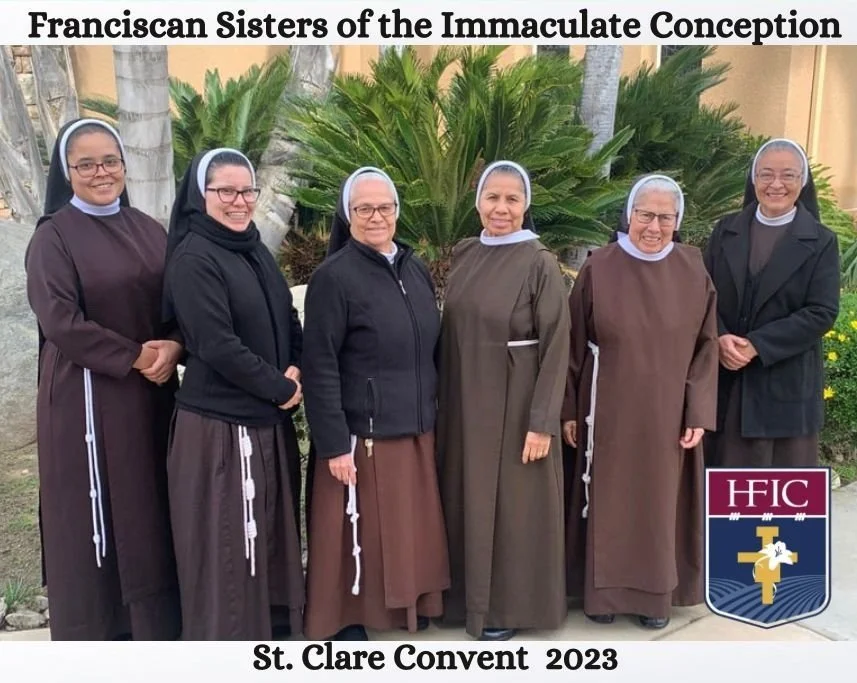Franciscan Sisters of the Immaculate Conception
Our History
Foundation of FSIC
The Franciscan Order was the first religious institute to establish itself in Mexico with the arrival of the 12 friars known as “The Twelve Apostles of Mexico” who, continuing the work of Saint Francis of Assisi of helping the poor and proclaiming Christ, developed numerous religious, educational and charitable services in favor of the indigenous peoples, that extended from Yucatan to New Mexico, Alta California and Texas.
On April 4, 1836, Jose Isidoro Morales Cordova was born in the town of Tlalmanalco, State of Mexico, to a Christian family. At age of 13 he entered the Apostolic College “San Francisco de Pachuca, Hidalgo” founded by the Alcantarinos (Barefoot) friars of the Province of San Diego, he was ordained a priest as Fray Jose del Refugio on July 8, 1860 amid strong currents of secularization and desacralizacion in the Republic of Mexico, which, among other things resulted in the prohibition of religious life community, and the confiscation of convents.
In these circumstances his superiors placed him in charge of the church of “La Encarnacion” in Mexico City, where he established the sodality of Mary to which, in 1874 he invites 3 young women: Dolores Vazquez, Manuela Mendez and Maria de Jesus Maldonado, to join hem and initiated the Pious Union of “Hijas del Corazon de Maria” (today the Franciscan Sister of the Immaculate Conception) with the purpose:
To “Repair the vineyard of the Lord” by works of Mercy and cultivating the profound values of consecrated life.
To “Repair the vineyard of the Lord” refers to the rebuilding of the church ravaged by the religious persecution of the Reform wars, by serving the sick and attending to the needs of that time. In addition, he inspired them to conserve, maintain and propagate the values of consecrated life in its two sources: contemplative and active.
Twenty years later, on April 13, 1894, father Refugio passed away leaving his spiritual patrimony to Mother Dolores Vazquez, who died three years later leaving as head of the new institute, Fray Jose Maria Najar of the Order of Friars Minor, OFM.
Apostolates of the FSIC
Since its foundation, the sisters’ main focus for their apostolic activity was the care of the sick, with their main interest being the salvation of souls. They were also devoted to and cared for orphaned children and the elderly who found themselves in a state of poverty. In the twentieth century, religious persecution was again unleashed in Mexico and elsewhere resulting in the expulsion of FSIC to Central America and with them the extension of their out growth.
Due to this situation, the Superior General Humilde Patlán Sanchez decided to send a group of sisters to North America in order to find a place to establish the novitiate for the congregation; although this was not achieved at the moment the first convent was founded in Santa Ana, California. Later, political conditions of the country allowed the development of the work in various states of Mexico. Medical care institutions and apostolates where the Congregation could serve the Church through Prayer, Education, Health, Missions, Evangelization and Catechesis, and Retreat homes, and Assistance Living facilities were established.
The Education Pastoral began in 1904 when the congregation took over the conducting of a private school in Mexico City previously run by Mrs. Esther Heavy; since then the sisters, work has spread steadily, through the Congregation's own schools as well as others in conjunction with dioceses, parishes and with the Brothers of the Christian Schools FSC (de La Salle) in Mexico and Central America. Technical and academic training of the sisters was strengthened through this partnership and allowed the establishment of even more schools.
Their educational Charism has developed in many works, among them the oldest and most significant: The College Caudillo Immortal (formerly Miguel Hidalgo) in San Luis de la Paz, Guanajuato in 1909; College progress in San Martin Texmecula, Puebla in 1914; College Justo Sierra (formerly Blessed Sacrament) in San Miguel de Allende, Guanajuato, between 1912-1914; Hidalgo Institute, in Texcoco, State of Mexico, founded in 1917, all in Mexico. In El Salvador, Central América, The Colegio El Espiritu Santo in San Salvador, 1932 and the Colegio Santa Isabel, in Cuscatlan, 1938.
The FSIC training of higher learning appears at Simón Bolívar University; which began as a School of basic education in the city of Mexico in 1944, and since 1981, offers undergraduate and graduate degrees in various subjects, and at the instituto Especializado de Educacion superior El Espiritu Santo in La Libertad, El Salvador founded in 1994, which is distinguished by the pedagogical formation of teachers in different branches.
Due to their significance and contribution to the development of Africa their Pre-Schools stand out in Guinea-Bissau and the Republic of Central Africa.
The Congregation is currently extended in 3 continents and 14 countries.
Serving the Church in:
Education
Health
Homes for unprotected children and for those with disabilities
Assisted Living Facilities
Evangelization and catechesis
Missions
Retreat Houses
